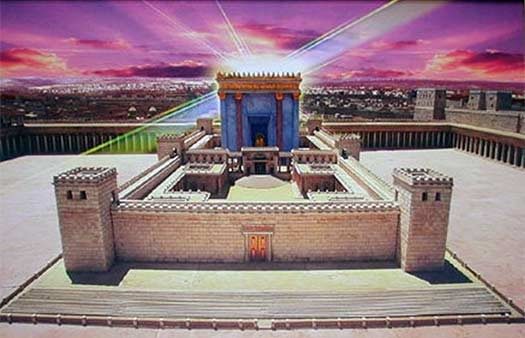 Rabbi David Etengoff ה' יעזור וירחם על אחינו כל בני ישראל, בארץ ישראל ובכל חלקי האר Like much of Sefer Vayikra, our parasha focuses on the korbanot. Accordingly, the second verse presents the mitzvah of the korban olah: “Command (tzav) Aharon and his sons, saying, ‘This is the law of the burnt offering: That is the burnt offering which burns on the altar all night until morning, and the fire of the altar shall burn with it.’” (Sefer Vayikra 6:2, this and all Rashi and Tanach translations, The Judaica Press Complete Tanach) Rashi (1040-1105), basing himself on Midrash Sifra on our verse and Talmud Bavli, Kiddushin 29a, explains “tzav” in this manner: “The expression tzav always denotes urging [to promptly and meticulously fulfill a particular commandment] for the present (miyad) and for future generations (v’ledorot).” The word, “miyad,” makes perfectly good sense in this context, since the kohanim were able to offer the korban olah during the time of the Mishkan and Beit HaMikdash. The term, “v’ledorot,” however, seems problematic, as we have not had a Mishkan or Beit HaMikdash for nearly 2,000 years. My rebbe and mentor, Rabbi Joseph B. Soloveitchik zatzal (1903-1993), known as “the Rav” by his students and followers, expands on our question: What is the meaning of the word ledoros (for future generations) in this context? The mitzvos of mezuzah, tefillin and Shabbos are clearly ledoros. Thousands of years have gone by, and these mitzvos are observed as they had been when they were originally given. But in what way are the mitzvos of the Mishkan practiced today? There has been no korban tamid [daily offering] for almost two thousand years! In what sense does the mitzvah of offering korbanos continue? (Sefer Vayikra Chumash Mesoras HaRav, with commentary based upon the teachings of Rabbi Joseph B. Soloveitchik, edited by Dr. Arnold Lustiger, page 33) The Rav begins his answer by citing a midrashic passage in Talmud Bavli, Megillah that presents a fascinating dialogue between Hashem and Avraham Avinu: Abraham asked how he was to know that G-d would not forsake Israel if they sinned. G-d answered, “In the merit of the [Temple] sacrifices.” Abraham insisted that this merit is fine when these sacrifices are in existence, but what was to happen after the destruction of the Temple? G-d replied that if the Children of Israel learned the laws surrounding the sacrifices, He would consider their study as a virtual sacrificial offering. When we cannot offer sacrifices, we recite the halachos [laws] pertaining to them as a substitute. (31b) In short, the study of the laws of korbanot enables us to bring “virtual sacrificial offerings” and fulfill these mitzvot in a substitute manner. At this juncture, the Rav extends his interpretation of “virtual” to include the Beit HaMikdash itself: There is a Mikdash in our days as well—not physically, but through halachic study. This is the mesorah [the passing down from each generation to the next] of Torah Sheb’al Peh, the Oral Law. Today, we read Parashas Shekalim as if the Beis Hamikdash was still standing; it is ledoros. Parashas Parah reminds us to be ritually pure so that we may bring the korban pesach. Although we no longer offer a korban pesach, we read Parashas Parah as if the Beis Hamikdash still exists. 2,000 years is a long time to wait for the rebuilding of the Beit HaMikdash. Nonetheless, this vision remains indelibly engraved in our neshamot, and was given powerful voice in the Shemoneh Esrei: Return in mercy to Yerushalayim Your city and dwell therein as You have promised; speedily establish therein the throne of David Your servant, and rebuild it, soon in our days, as an everlasting edifice. Blessed are You Hashem, who rebuilds Yerushalayim. (Shemoneh Esrei, translation, https://www.chabad.org/library/article_cdo/aid/867674/jewish/Translation.htm) With Hashem’s overflowing kindness and mercy, may we be zocheh to serve Him in the rebuilt Beit HaMikdash in our time, v’ledorot—and for all generations to come! V’chane yihi ratzon. Shabbat Shalom Past drashot may be found at my blog-website: http://reparashathashavuah.org Please contact me at [email protected] to be added to my weekly email list. *** My audio shiurim on the topics of Tefilah and Tanach may be found at: http://tinyurl.com/8hsdpyd *** I have posted 164 of Rabbi Soloveitchik’s English language audio shiurim (MP3 format) spanning the years 1958-1984. Please click on the highlighted link: The Rav
0 Comments
Leave a Reply. |
Details
Archives
July 2024
AuthorTalmid of Rabbi Soloveitchik zatzal Categories |
- Blog: Rabbi David Etengoff: Parashat HaShavuah
- Sefer Bereishit 5784&5785
- Sefer Shemot 5784&5785
- Sefer Vayikra 5784&5785
- Sefer Bamidbar 5784 &5785
- Sefer Bereishit 5782&5783
- Sefer Shemot 5782&5783
- Sefer Vayikra 5782&5783
- Sefer Bamidbar 5782&5783
- Sefer Devarim 5782&5783
- Sefer Bereishit 5780& 5781
- Sefer Shemot 5780&5781
- Sefer Vayikra 5780&5781
- Sefer Bamidbar 578&5781
- Sefer Devarim 578&5781
- Sefer Bereishit 5778&5779
- Sefer Shemot 5778&5779
- Sefer Vayikra 5778&5779
- Sefer Bamidbar 5778&5779
- Sefer Devarim 5778&5779
- Sefer Bereishit 5776&5777
- Sefer Bereishit 5774&5775
- Sefer Bereishit 5772&5773
- Sefer Bereishit 5771&5770
- Sefer Shemot 5776&5777
- Sefer Shemot 5774&5775
- Sefer Shemot 5772&5773
- Sefer Shemot 5771&5770
- Sefer Vayikra 5776&5777
- Sefer Vayikra 5774&5775
- Sefer Vayikra 5772&5773
- Sefer Vayikra 5771&5770
- Sefer Bamidbar 5776&5777
- Sefer Bamidbar 5774&5775
- Sefer Bamidbar 5772&5773
- Sefer Bamidbar 5771&5770
- Sefer Devarim 5776&5777
- Sefer Devarim 5774&5775
- Sefer Devarim 5772&5773
- Sefer Devarim 5771&5770
 RSS Feed
RSS Feed
